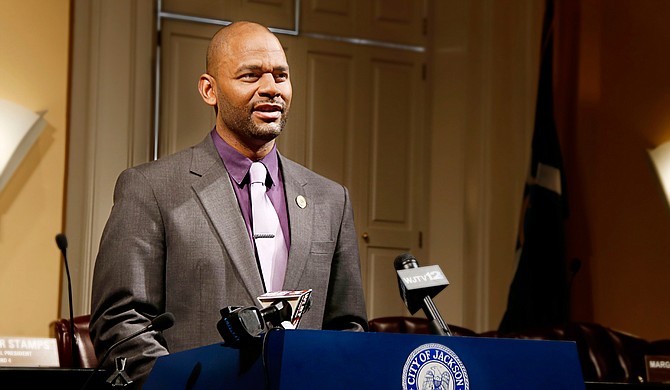Jackson City Council President De'Keither Stamps' hate-crimes reporting ordinance passed June 30, 2015. The ordinance requires police to compile hate-crimes data and submit a report each year to the council. Photo by Imani Khayyam.
Amid tensions following the mass shooting in Charleston, S.C., and over the legalization of same-sex marriages across the nation, the Jackson City Council this morning passed an ordinance requiring the reporting of hate crimes within the city limits.
On June 29, during a rally to remove the Confederate stars and bars from the Mississippi flag, Council President De'Keither Stamps, of Ward 4, called on participants to "challenge the conscience of our leaders" to change the flag and also to support the hate-crime ordinance, which he sponsored.
Stamps' ordinance defines a hate crime as "any crime committed against an individual particularly based on that person's actual or perceived race, color, religion, ethnicity, ancestry, national origin, gender, sexual orientation, age or disability."
In June 2014, the Jackson City Council approved a resolution affirming equality for all citizens, including LGBT people. Stamps' proposal requires the Jackson police chief to develop guidelines for collecting and documenting hate-crime data in the city as well as for training officers. It also requires the mayor to allocate the necessary resources to the Jackson Police Department.
In addition, the proposal requires JPD to provide the city council an annual report that includes the date and time of the alleged (hate) crime; the area of the city in which the alleged crime occurred; the characteristics of the alleged perpetrator(s) and victim(s) (e.g. race, sexual orientation, gender, religion, age, etc.); and the nature of the crime.
"It's good to keep the numbers so you can see if you're increasing or decreasing," Ward 3 Councilman Kenneth Stokes said at today's meeting.
Council members held but did not vote on a proposed resolution honoring the life of James Craig Anderson. Anderson was killed in 2011 when 18-year-old Deryl Dedmon, of Brandon, ran Anderson over with a truck. Dedmon and nine co-conspirators were eventually convicted in the largest federal prosecution under the 2009 Matthew Shepard and James Byrd Jr. Hate Crimes Prevention Act, named after a young gay man killed in Wyoming, and a black man in Texas who was murdered; courts later found that both crimes were motivated by hate.
The James Anderson resolution was held because today, June 30, is Anderson's 54th birthday, and his family wanted to celebrate in private.
Jody Owens, managing attorney for the Southern Poverty Law Center of Mississippi and one of the lawyers who represented the Anderson family in a civil lawsuit, said the Anderson case, the Charleston AME massacre—in which a white man named Dylann Roof is charged with nine counts of murder—and the recent U.S. Supreme Court ruling striking down same-sex marriage bans all reinforce the need for Jackson's ordinance.
"The capital city is saying we're going to record this and make sure that people are trained accordingly and make sure we're not afraid to acknowledge that these things happen to Mississippians," Owens told the Jackson Free Press this morning.
Owens called it a good first step and said he hopes that the Legislature will pass a hate-crime reporting law or that other cities will follow Jackson's lead and enact their own ordinances in the meantime.
"I don't think any city should have to wait on the state to do something they think will improve the safety of its citizens, and that's what the City of Jackson is doing," Owens said.



Comments
Use the comment form below to begin a discussion about this content.